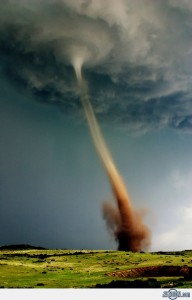It’s April, which for a lot of us across the United States means tornado season. Because spring is a transitional period for climate, there are more chances of cooler air meeting with warmer air, resulting in more thunderstorms and tornadoes. None of us wants to speculate we may be the victim of a severe weather event, but it happens to people all the time. You would think that we would look at our poor, beleaguered neighbors in other states who have suffered disasters and make a vow to become better prepared. But procrastination reigns free when there is no (perceived) imminent danger; and eventually we forget about the need for assembling emergency supplies. And beyond the immediate concerns of safety and shelter are the less thought-of, but extremely important, financial ramifications of surviving a disaster.
for a lot of us across the United States means tornado season. Because spring is a transitional period for climate, there are more chances of cooler air meeting with warmer air, resulting in more thunderstorms and tornadoes. None of us wants to speculate we may be the victim of a severe weather event, but it happens to people all the time. You would think that we would look at our poor, beleaguered neighbors in other states who have suffered disasters and make a vow to become better prepared. But procrastination reigns free when there is no (perceived) imminent danger; and eventually we forget about the need for assembling emergency supplies. And beyond the immediate concerns of safety and shelter are the less thought-of, but extremely important, financial ramifications of surviving a disaster.
So let’s play “what if.” If you knew your home was going to be destroyed in the next 24 hours, how would you begin to prioritize your needs? What would you take if you knew that everything was going to be destroyed? This is unpleasant thinking, but it is important to plan while you are in a calm state of mind and not in “panic” mode. Below are some suggestions of items you might want to begin storing, purchasing, or getting organized.
• Food and water — It may be difficult to find something to eat or drink the first few days after a disaster, so this should be of primary concern. Don’t forget to include a manual can opener!
• Flashlight and batteries – Odds are high that you will have no power for an extended period of time and will need illumination after darkness falls.
• First aid kit – Emergency personnel will respond to the most severe cases first. You should be able to care for family and neighbors in the event EMT’s can’t get to you, or if your medical needs are minor.
• Clothing – a couple days of clothing changes for everyone in the family will see you through the first, most unorganized, days.
• Tent, sleeping bags, and/or blankets – You may need to take shelter out-of-doors until you can make other housing arrangements.
• Cash – There may not be power to operate banks, grocery stores, drug stores, etc. With cash, you would still be able to purchase goods and services (assuming those entities still exist as well).
• Important documents – Pull birth certificates, social security cards, account numbers for banks and credit cards, and/or any other documents that would be difficult or time-consuming to replace.
• Laptop and cell phones – they may not work after the charge runs down, but you would be able to contact family members, friends, or employers in the short term to inform them of your safety and condition.
• Family mementos – Something small and meaningful, such as a few pictures, might not be too much of a hindrance to include, but should be kept to a minimum.
One of the luxuries of living in the year 2013 is that we have extremely advanced weather reporting systems. Local Doppler radars keep us updated, literally, minute by minute of weather changes. Unfortunately, weather disasters may happen in the middle of night, when you are disoriented and vulnerable. We have tornado sirens in our community, but some people are such heavy sleepers they can sleep right through a warning alert. Be sure to watch the news on a regular basis every day so you are cognizant of weather issues and the potential for a severe outbreak of bad weather. Tornadoes, flash floods, and even severe thunderstorms can wreak havoc in a split second. I grew up in the Midwest, and like most young girls, spent a few years as a member of Girl Scouts. Their motto, “Be Prepared,” is as relevant today as it was when I was a child.
Written by:
Donna Green
Family & Consumer Sciences Educator
Ohio State University Extension

